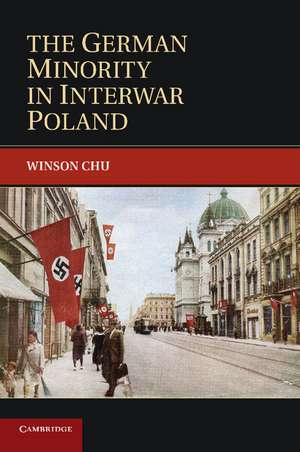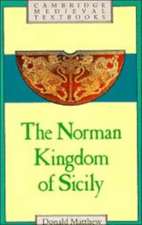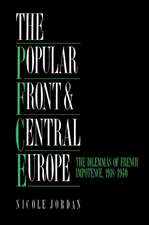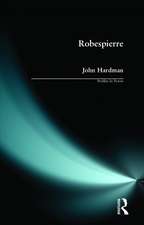The German Minority in Interwar Poland: Publications of the German Historical Institute
Autor Winson Chuen Limba Engleză Paperback – 5 feb 2014
| Toate formatele și edițiile | Preț | Express |
|---|---|---|
| Paperback (1) | 289.95 lei 6-8 săpt. | |
| Cambridge University Press – 5 feb 2014 | 289.95 lei 6-8 săpt. | |
| Hardback (1) | 698.50 lei 6-8 săpt. | |
| Cambridge University Press – 24 iun 2012 | 698.50 lei 6-8 săpt. |
Din seria Publications of the German Historical Institute
- 14%
 Preț: 757.52 lei
Preț: 757.52 lei - 8%
 Preț: 530.72 lei
Preț: 530.72 lei -
 Preț: 283.52 lei
Preț: 283.52 lei - 14%
 Preț: 757.52 lei
Preț: 757.52 lei -
 Preț: 352.63 lei
Preț: 352.63 lei - 11%
 Preț: 695.06 lei
Preț: 695.06 lei -
 Preț: 207.41 lei
Preț: 207.41 lei -
 Preț: 282.17 lei
Preț: 282.17 lei - 11%
 Preț: 574.38 lei
Preț: 574.38 lei -
 Preț: 289.39 lei
Preț: 289.39 lei - 14%
 Preț: 1279.78 lei
Preț: 1279.78 lei -
 Preț: 327.41 lei
Preț: 327.41 lei -
 Preț: 439.33 lei
Preț: 439.33 lei - 11%
 Preț: 552.00 lei
Preț: 552.00 lei - 11%
 Preț: 524.04 lei
Preț: 524.04 lei - 14%
 Preț: 871.52 lei
Preț: 871.52 lei - 11%
 Preț: 458.99 lei
Preț: 458.99 lei - 14%
 Preț: 755.87 lei
Preț: 755.87 lei -
 Preț: 453.12 lei
Preț: 453.12 lei - 14%
 Preț: 756.70 lei
Preț: 756.70 lei -
 Preț: 331.28 lei
Preț: 331.28 lei -
 Preț: 318.06 lei
Preț: 318.06 lei - 14%
 Preț: 755.69 lei
Preț: 755.69 lei -
 Preț: 353.83 lei
Preț: 353.83 lei - 11%
 Preț: 578.20 lei
Preț: 578.20 lei -
 Preț: 321.90 lei
Preț: 321.90 lei -
 Preț: 284.78 lei
Preț: 284.78 lei - 14%
 Preț: 937.61 lei
Preț: 937.61 lei -
 Preț: 471.93 lei
Preț: 471.93 lei -
 Preț: 422.91 lei
Preț: 422.91 lei - 11%
 Preț: 589.88 lei
Preț: 589.88 lei -
 Preț: 315.72 lei
Preț: 315.72 lei - 11%
 Preț: 693.36 lei
Preț: 693.36 lei - 14%
 Preț: 870.01 lei
Preț: 870.01 lei -
 Preț: 287.07 lei
Preț: 287.07 lei - 23%
 Preț: 950.10 lei
Preț: 950.10 lei -
 Preț: 384.34 lei
Preț: 384.34 lei -
 Preț: 448.49 lei
Preț: 448.49 lei - 5%
 Preț: 312.62 lei
Preț: 312.62 lei -
 Preț: 319.52 lei
Preț: 319.52 lei -
 Preț: 243.74 lei
Preț: 243.74 lei
Preț: 289.95 lei
Nou
Puncte Express: 435
Preț estimativ în valută:
55.49€ • 57.86$ • 46.12£
55.49€ • 57.86$ • 46.12£
Carte tipărită la comandă
Livrare economică 20 martie-03 aprilie
Preluare comenzi: 021 569.72.76
Specificații
ISBN-13: 9781107634626
ISBN-10: 1107634628
Pagini: 344
Ilustrații: 3 b/w illus. 3 maps
Dimensiuni: 153 x 229 x 21 mm
Greutate: 0.5 kg
Editura: Cambridge University Press
Colecția Cambridge University Press
Seria Publications of the German Historical Institute
Locul publicării:New York, United States
ISBN-10: 1107634628
Pagini: 344
Ilustrații: 3 b/w illus. 3 maps
Dimensiuni: 153 x 229 x 21 mm
Greutate: 0.5 kg
Editura: Cambridge University Press
Colecția Cambridge University Press
Seria Publications of the German Historical Institute
Locul publicării:New York, United States
Cuprins
Figures; Tables; Acknowledgements; Note on translations, place names, and concepts; Abbreviations and acronyms; Introduction; 1. Phantom Germans: Weimar revisionism and Poland (1918–33); 2. Residual citizens: German minority politics in Western Poland (1918–33); 3. On the margins of the minority: Germans in Łódź (1900–33); 4. Negotiating Volksgemeinschaft: national socialism and regionalization (1933–7); 5. Revenge of the periphery: German empowerment in central Poland (1933–9); 6. Lodzers into Germans? (1939–2000); Conclusion; Bibliography; Index.
Recenzii
'In this fine study, Winson Chu examines the political sources of cohesion and conflict among ethnic Germans in interwar Poland. Because he demonstrates the prevalence of internal conflict even into the Nazi era, he significantly complicates conventional views about ethnic politics in Europe between the wars.' Roger Chickering, Emeritus Professor, Georgetown University
'Winson Chu's authoritative study of the Germans of interwar Poland reminds us that under the rhetorical surface, nationalist conflict more frequently seeks to police its own supporters rather than to defeat an 'enemy nation'. He demonstrates convincingly that regional German nationalist interests in Poland were fundamentally irreconcilable, that Polish repression hardly caused these differences, and that the advent of the Nazi regime in Germany reinforced the existing fragmentation of regional German political interests in Poland.' Pieter M. Judson, Swarthmore College
'In exposing the internal and regional divisions within Poland's German minority, Chu forces us to confront the disconnect between the rhetoric and the reality of national solidarity in this period, and to reexamine the relationship between national identity, regionalism, citizenship, and borders (geographic, political, and cultural) … there is a great deal of interesting material here that is sure to generate discussion and further research.' Slavic Review
'Chu shows in a fascinating epilogue how attempts to promote a sense of unity within West Germany among German refugees and expellees from Poland were crosscut by the persistence within the Landsmannschaften and in expellee narratives of regional identities, stereotypes, and rivalries.' Elizabeth Harvey, The Journal of Modern History
'… [an] excellent book … Chu's focus on the regional distinctiveness of Germans in Poland allows us to appreciate the ironies of their nationalization and the combination of völkisch wholeness with regional divisiveness.' Shelley Baranowski, Holocaust and Genocide Studies
'Winson Chu's authoritative study of the Germans of interwar Poland reminds us that under the rhetorical surface, nationalist conflict more frequently seeks to police its own supporters rather than to defeat an 'enemy nation'. He demonstrates convincingly that regional German nationalist interests in Poland were fundamentally irreconcilable, that Polish repression hardly caused these differences, and that the advent of the Nazi regime in Germany reinforced the existing fragmentation of regional German political interests in Poland.' Pieter M. Judson, Swarthmore College
'In exposing the internal and regional divisions within Poland's German minority, Chu forces us to confront the disconnect between the rhetoric and the reality of national solidarity in this period, and to reexamine the relationship between national identity, regionalism, citizenship, and borders (geographic, political, and cultural) … there is a great deal of interesting material here that is sure to generate discussion and further research.' Slavic Review
'Chu shows in a fascinating epilogue how attempts to promote a sense of unity within West Germany among German refugees and expellees from Poland were crosscut by the persistence within the Landsmannschaften and in expellee narratives of regional identities, stereotypes, and rivalries.' Elizabeth Harvey, The Journal of Modern History
'… [an] excellent book … Chu's focus on the regional distinctiveness of Germans in Poland allows us to appreciate the ironies of their nationalization and the combination of völkisch wholeness with regional divisiveness.' Shelley Baranowski, Holocaust and Genocide Studies
Descriere
Explores what happened when Germans from three different empires were forced to live together in Poland after the First World War.













